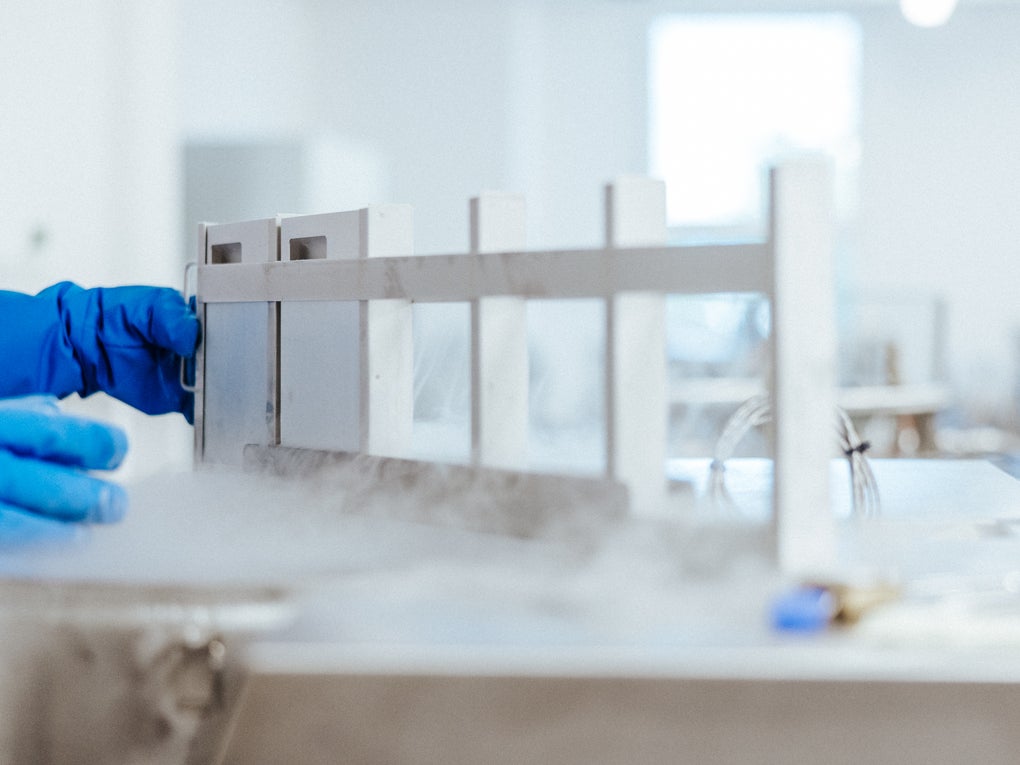
DKMS Stem Cell Bank: providing faster help and a better chance of a cure to blood cancer patients
At DKMS we have established a faster and more efficient infrastructure for hematopoietic stem cell transplantation for blood cancer patients – with our DKMS Stem Cell Bank in Dresden, where surplus adult stem cells are cryopreserved as Adult Donor Cryopreserved Units (ADCUs). These cells can be made available for transplantation to patients worldwide. Transplant centers and search units can search for and request ADCUs via the DKMS Registry and the database of the Central Bone Marrow Donor Registry Germany (ZKRD). In unrelated hematopoietic stem cell transplantation, the donor's availability and the time from request to transplantation are crucial factors in ensuring a successful outcome. In order to facilitate the fastest possible supply of life-saving stem cells, it only takes a few days from the request for ADCUs to their transportation to the respective clinic, meaning transplants can take place much faster than before. Additionally, this way stem cell donors can potentially save two lives with one donation. “This is another important milestone in our lifesaving mission,” said Dr. Elke Neujahr, Global CEO of DKMS Group. “We are thus significantly increasing the chance of survival for patients in 60 countries in urgent need of a transplant.”
Every 27 seconds, someone in the world is diagnosed with a blood cancer or a blood disorder. Many of these patients require a stem cell transplant, leading to a search for a suitable donor that is ultimately a race against time – only around one third find a match within their family. The majority are therefore dependent on an unrelated donor whose HLA characteristics match the patient’s as closely as possible. The earlier a match is found and the faster the stem cells are transplanted, the better the chances of survival and long-term recovery.
Better prospects for blood cancer patients
Once a suitable allogeneic donor has been identified, it usually takes several weeks before the stem cells can be collected and the transplantation can take place. With cryopreserved stem cells, it only takes three days between the first request and the transportation to the clinic. For some types of blood cancer, a quick transplantation increases the success of treatment. “This was the initial motivation for expanding our activities as a stem cell bank,” explains Dr. Dr. Alexander Schmidt, Global Chief Medical Officer of DKMS Group. “Under the pressure of the Covid-19 pandemic, our plans to provide stem cells that are 100 percent and immediately available, even without the presence of donors, solidified. The result is an innovative and pioneering facility that allows for a faster and more efficient blood cancer treatment.” Originally established and continuing to operate as a cord blood bank, the DKMS Stem Cell Bank has many years of experience and extensive expertise in cryopreservation.
Cryopreserved stem cells place no additional burden on donors
To date, the approach is unique worldwide, while remaining uncomplicated and ethically sound in regards to the donor. “In our experience, many donors mobilize significantly more stem cells than a single blood cancer patient needs,” states Dr. Alexander Platz, Medical Director of the DKMS Stem Cell Bank. Donors who are already donating for a specific person must agree to store their stem cells in the stem cell bank before apheresis. If they do, the stem cells in excess of the amount needed for the patient are cryopreserved and stored at -180 °C in the vapor phase of liquid nitrogen. “This way, our donors can potentially save two lives with a single donation,” Dr. Platz points out. For the donors, the collection of excess cells only requires a slightly longer apheresis. DKMS will initially only consider donors with particularly common HLA genotypes and therefore an associated higher probability of being requested by a transplant center. The first stem cells have been cryopreserved in Dresden since November 2023. Around 70 ADCUs are already stored and available in the cryo-tanks thus far and we are now working on gradually increasing this number.
The stem cells are collected at the two DKMS Collection Centers in Dresden and Cologne and the Apheresis Center at the University Hospital Carl Gustav Carus Dresden and then stored in the stem cell bank. “We are working on expanding this network of collection centers,” says Dr. Elke Neujahr. “The more stem cells we can store, the more likely we are to quickly give patients a hope of life in the race against time.”